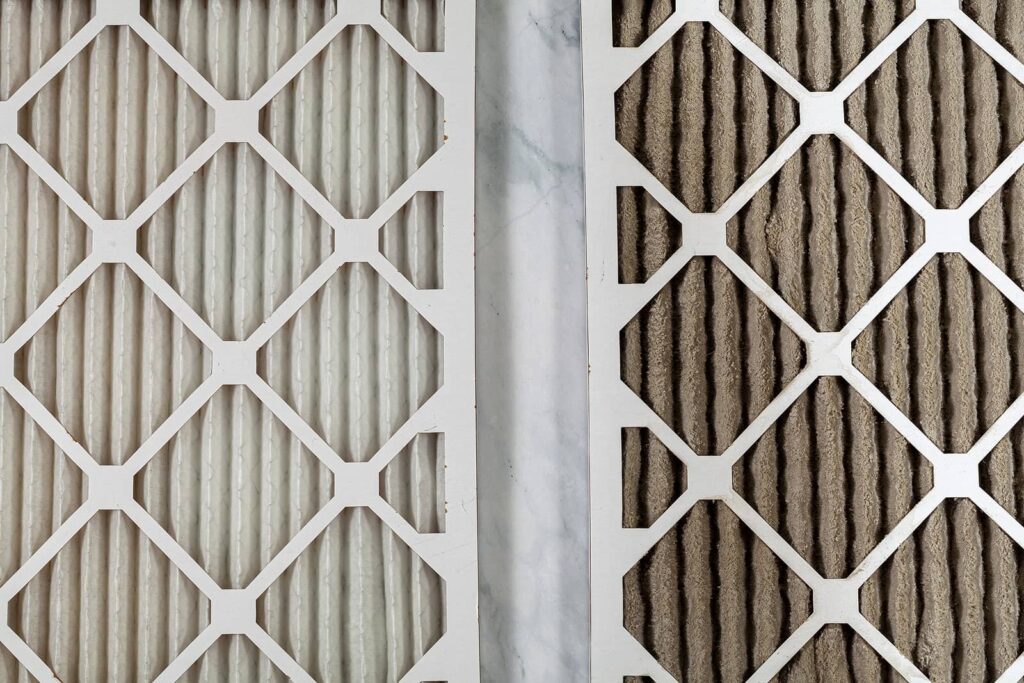If your home has a central heating system, you may have noticed that when you fire the heat up for the first time of the season, it emits an odd odor that smells like burning. What’s the cause of this smell, and what should you do about it? The truth is, strange smells coming from your heater can be alarming, but they’re not always a cause for concern. However, there are some specific cases where it’s best to call an HVAC contractor for help. This is especially true, if you notice the burning smell later in the season, not when you’re first turning the heat on.

Where Does That Burning Smell Come From?
For residents of North Texas, it’s common for the heating system to go unused throughout most of spring and fall, as well as during summer. During this dormant period, dust can fall and settle on the heating equipment that’s part of the system. This can happen with any kind of heating system, whether it’s separate from your air conditioning or a combined HVAC system that both heats and cools. If the system has components that are dormant during warm weather, then those components will accumulate dust when not in use.
The first day you turn on the central heating, all of that collected dust gets burned off as the system heats up. The reason your heat system emits that burning odor is simply that all that dust is burning up. It’s a completely normal part of using the system, and there’s usually nothing to worry about. As the dust burns up the odor may get stronger, but after a couple of hours of using the heat, it will start to fade. In most cases you’ll only smell burning the first time you turn on the heat for the winter.
Can You Prevent That Burning Smell?
If you’re not fond of the smell of burning dust, you have a couple of options that can help you reduce it. You may not be able to completely avoid the burning smell, but it definitely won’t be as strong.
1. Change the filter in your HVAC system
The filter in your central heating system is designed to capture dust and other particles to remove them from the air. Over time, as the filter collects more and more dust, it becomes less effective and can contribute to odors. A clogged filter will reduce efficiency and provide ample dust to burn when you turn your heater on. Cleaning or changing the filter before firing up the heat for the first time will reduce the amount of dust in the system and help reduce that burning smell. Plus, with a new filter the system is more effective at removing airborne particles, so the smell should clear faster.
2. Give your heating system a professional tune-up
The most effective way to reduce heater smells is to call an HVAC professional and schedule an appointment for professional maintenance. Any HVAC system runs more efficiently with regular maintenance, twice a year for best results. Schedule these appointments for spring and fall, and your HVAC system will always be at its best when you most need it.
With heat and AC maintenance, there are tasks that homeowners can do, such as changing out the filter. However, there are other tasks that are better done by an HVAC specialist. This includes tasks like calibrating the thermostat, replacing worn parts such as belts and motors, and testing wiring connections.
When you have your system professionally maintained all of these tasks are done for you, so your HVAC stays in great shape. It runs more efficiently, uses less energy, and lasts longer. HVAC maintenance also reduces the amount of dust in the system, so there’s less of that burning smell when you start your heater up for the first time.

When Are Heater Smells a Sign There’s Something Wrong?
Most of the time, that burning-dust smell is nothing to worry about, especially if it only happens the first time you fire up the heat. But what if the burning smell persists for longer than that? If the burning smell persists—or you smell burning coming from the heater at any other time—then there may be some cause for concern. Unusual heater smells can be a sign there’s something wrong, so it’s never a good idea to ignore them. If you smell any of these unusual smells coming from your furnace or air vents, call an HVAC professional for advice and/or furnace repairs.
Unusual heater smells can include:
- Musty smell: Musty smells can simply be a sign that the system hasn’t been used in a while. If the smell is gone after the first use of the season, it’s not a cause for worry. But if the smell persists, or if it smells moldy, there may be mold or mildew in the air ducts, or elsewhere in the system.
- A persistent smell: Musty, moldy, or burning odors that persist for longer than the first use of the heater.
- Burning plastic: If you smell burning plastic, instead of just burning dust, you should call an HVAC professional. A burning plastic smell can be caused when components such as the furnace capacitor or fan belt are worn out. Melting insulation can also cause a burning smell. Because some of these issues can be caused by faulty wiring, the safest thing to do is turn off the system and call an HVAC technician to take a look at the system.
- Electrical odor: A burning odor that smells electrical. This can be due to an overheated blower motor, which may be the result of a dirty filter. Change the filter, if it’s dirty, and if the smell persists, call in an HVAC technician for help.
- Rotten eggs odor: Natural gas has an odor that smells like rotten eggs. Because the gas is flammable and combustible, smelling natural gas in your home can be a sign that it’s unsafe. If you think you smell natural gas inside or an inexplicable rotten egg smell, it may be that you have a gas leak, coming from a gas furnace or elsewhere in your house. In this case, the safest thing to do is immediately evacuate and call emergency services or your local gas company for help. A gas leak is always a safety hazard and should be handled by a professional.
When You Need Help with Unusual Heater Smells, Call an HVAC Professional
For all unusual smells coming from your heater or air conditioning, the best course of action is to call a professional. An HVAC technician can safely find the source of the problem, and fix it quickly, so that you’re not left without heat or AC when you most need it.

















